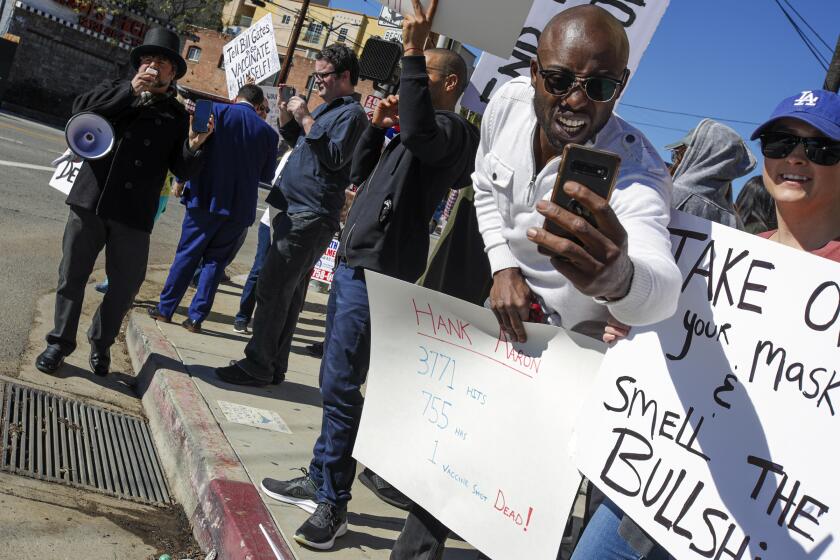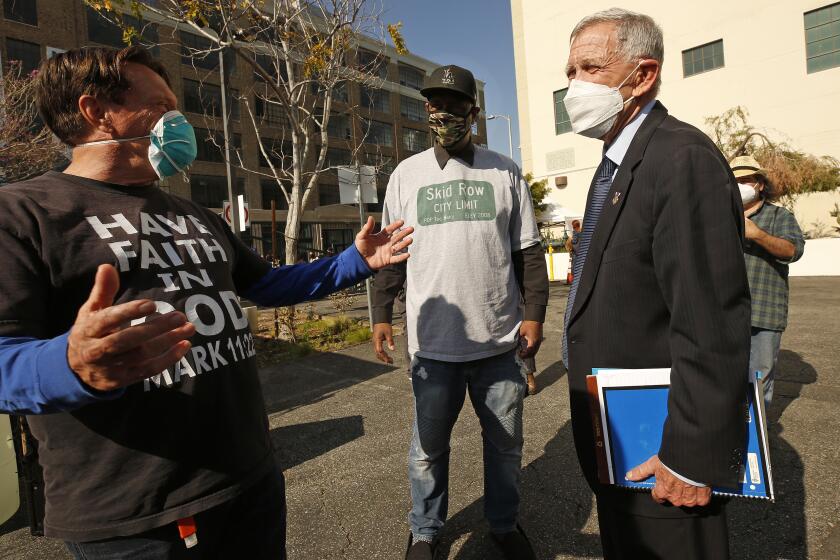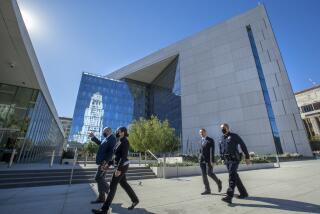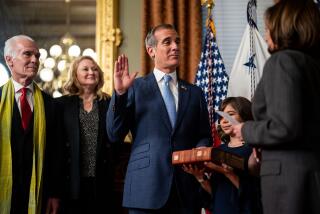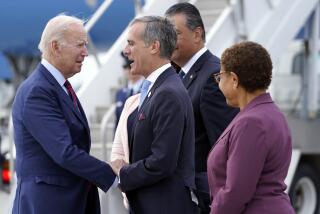L.A.’s first lady, Amy Wakeland, navigates shifting political fortunes in final Garcetti years
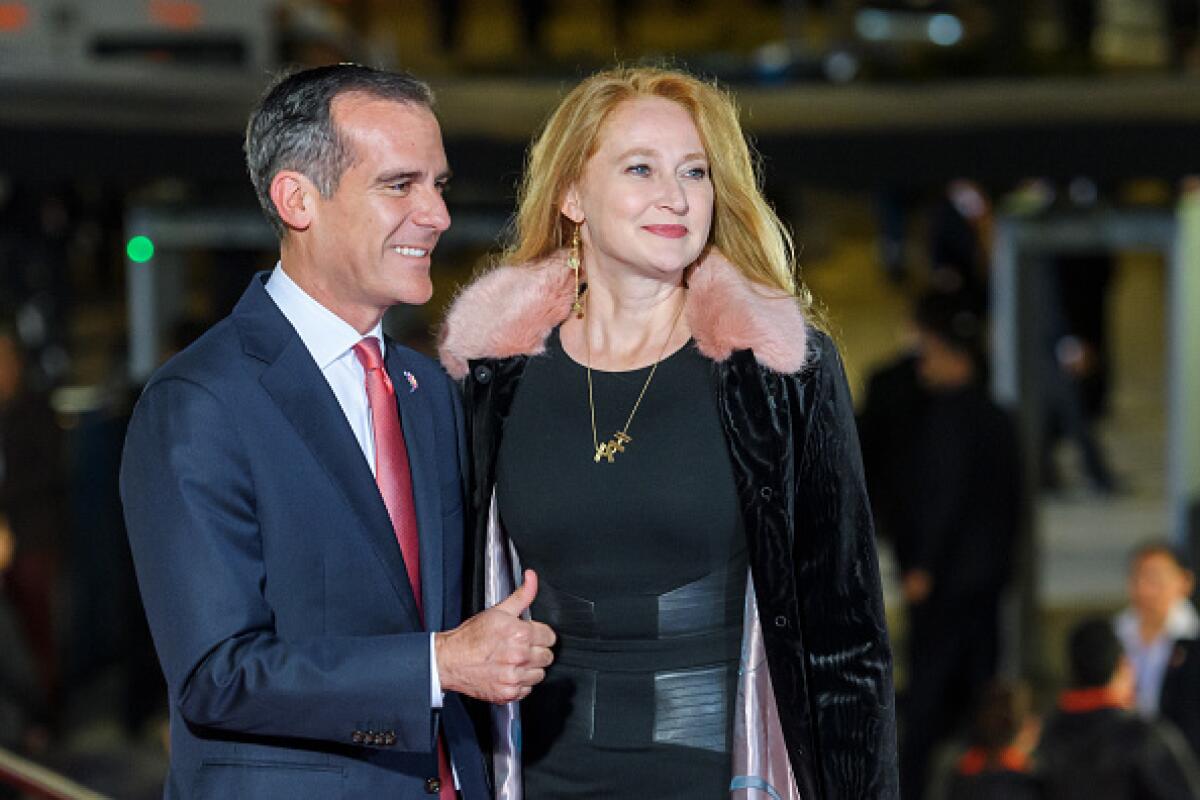
- Share via
At the end of a very long and trying 2020, the first lady of Los Angeles recalled the protests over racial injustice and coronavirus restrictions that went on outside her home nearly every day.
Demonstrators chanted into bullhorns and sometimes shouted profanely, Amy Elaine Wakeland said. Mayor Eric Garcetti’s wife said she notified the family’s Los Angeles Police Department security detail whenever the disruptions got so bad that the couple’s 9-year-old daughter couldn’t complete her homework or get to sleep. From March through the end of the year, Wakeland made about 80 complaints in all.
“I would be lying to you,” she said in a recent interview, “to not tell you that it is hard on my daughter and the children in this neighborhood.”
Wakeland acknowledged the protesters’ right to gather outside Getty House, the official residence of the mayor, but also questioned how much good they had done. “I don’t think you build movements by yelling at people,” she said.
During Garcetti’s first seven years in office, the mayor’s mansion had been a place for public celebrations and activist forums, with Wakeland often taking the lead. Los Angeles and its first couple seemed to be on a steady ascent, with a landslide reelection in 2017, a winning plan to host the 2028 Summer Olympics, record-setting trade and tourism, and talk of a run for the White House.
But 2020 bent the curve in ways that nobody wanted. Homelessness reached a new high in Los Angeles. The city became an epicenter of the COVID-19 pandemic. And even Getty House could not provide a refuge for Wakeland and Garcetti, who faced a string of personal and professional crises like none they had confronted before.
First, Rick Jacobs, Wakeland’s longtime friend and a key advisor to Garcetti, was accused of sexual harassment by the mayor’s bodyguard, and then by journalist Yashar Ali and two other men. Jacobs has denied some allegations and not responded to others.
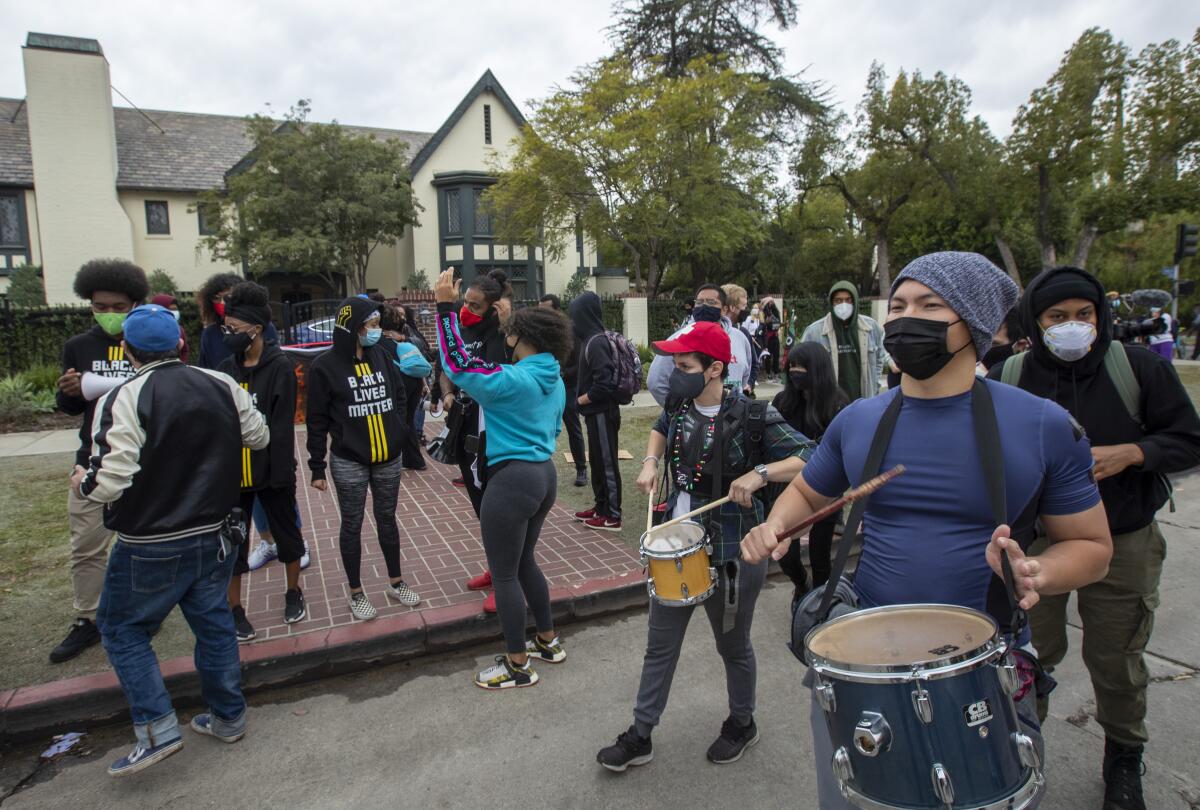
Then, Black Lives Matter Los Angeles brought its fervid opposition to Garcetti’s front door, protesting his possible appointment to a Cabinet position under President Biden. Ultimately, no Cabinet post came.
In mid-December, daughter Maya Garcetti’s coronavirus diagnosis brought the pandemic siege home, one of thousands of cases that has made Los Angeles the object of national scrutiny for its leaders’ handling of the health crisis.
The headline-making events have made it impossible for even the media-shy Wakeland to insulate herself from the troubles facing her and her husband. After their most stressful year in politics, both Garcetti and the woman he has called his closest advisor and confidant must now plot a way forward in his final chapter as mayor.
“I want to be here,” Garcetti said, in announcing he would not be going to Washington. “I need to be here.”
Wakeland, 51, began her interview with The Times by apologizing for repeatedly canceling the scheduled meeting.
“It has been quite a year,” she said.
**
Wakeland and Garcetti have been together for a quarter of a century and married for nearly half that time, a union that the mayor routinely cites as his most important relationship and a key to shaping his view of the world and the city he has governed for nearly eight years.
The organizer behind the Dodger Stadium vaccine protest said the group didn’t mean to shut it down. Buoyed by the attention, he vows more to come.
Wakeland gets credit from many people for helping her husband win the mayor’s office in 2013, for informing his progressive agenda during his first years in office and for steering Los Angeles city government toward greater gender equity — increasing the hiring of women on city commissions and in the municipal workforce.
Although the mayor is widely seen as a conciliator by nature, Wakeland serves as a sharper-edged alter ego, observers said.
For all her commitment in her public life to the less fortunate, Garcetti’s wife has also dismayed or infuriated some of those she has encountered in private. Along the way, she has alienated some city leaders and nurtured grudges against outsiders deemed insufficiently loyal to the Garcetti administration, multiple civic activists and former city employees said.
Wakeland said she had built her life around trying to help people from disadvantaged backgrounds. She disputed accounts that depicted her as vindictive and demanding, saying, “My life is built on kindness and compassion and generosity.”
Garcetti called Wakeland “my rock” and “a rock star.” In a recent video interview, he described the countless hours she had worked, without pay, to make Los Angeles a better place.
He rejected the idea that his wife served as an enforcer, calling that notion “dehumanizing.” He blamed contrary views on “sexist cliches and gossip” and disputed long-standing assertions that he shied away from tough decisions.
“I make tough decisions every fricking day here,” Garcetti said. “I’m proud of them, whether it’s in this pandemic or other times.”
Political consultant Eric Hacopian compared the city’s first couple to another famous political tandem — Bill and Hillary Clinton.
“They come as a team. She is as much of a political actor as he is,” Hacopian said. “Just like any highly political figures, they have long memories of who was with them and who was against them.”
A longtime friend said it’s silly and simplistic to try to hang a single label on Wakeland, or L.A.’s first couple.
“Amy comes from a really humble place and has true empathy for people who are struggling, as does Eric,” said the friend, who asked not to be named, out of fear of alienating Wakeland. “But can she be a little abrasive? Of course. Can part of their culture be that they hold on to beefs more than they should? Yes, that’s also kind of incontrovertible.”
One L.A. politician learned there could be a cost, quite literally, to getting on Wakeland’s bad side.
The conflict grew out of the 2019 school board race in which Garcetti and Wakeland backed his longtime aide, Heather Repenning, against Jackie Goldberg. A Los Angeles political mainstay, Goldberg told one campaign forum that she believed Wakeland, and therefore Repenning, had ties to charter schools, which she blamed for siphoning money from traditional public campuses.
Not long after Goldberg offered that critique, her pay — as the head of a Garcetti-backed program to hire more disadvantaged residents into city jobs — stopped for several weeks.
Goldberg was told by a member of the mayor’s staff that if she wanted to receive a $10,000 payment due to her, she should apologize to Wakeland for her campaign comments, according to a source familiar with the situation. Goldberg made the apology to Wakeland and, not long afterward, the city issued Goldberg her $10,000, said the source, who declined to be named out of fear of angering Wakeland and Garcetti.
Goldberg confirmed the source’s account but declined to provide additional details. She said she was on the same side of many social justice issues as Garcetti and Wakeland.
“I respect the work Amy does in this city. And it’s all on issues I care a lot about,” Goldberg said. “Any problems I had, I am long past them.”
Aides in the mayor’s office insisted Goldberg had never been paid late and that the gap in compensation was due to a lapse in her contract.
Asserting her “utmost respect” for Goldberg, Wakeland said, “I never heard of such a thing happening.”
**
In two video interviews with The Times for this story, Wakeland spoke proudly about her husband’s tenure — describing the city’s early push for social distancing in the COVID-19 pandemic, the passage of a county sales tax increase to fund transit projects, enactment of a $15-per-hour minimum wage and increased opportunities for women and girls.
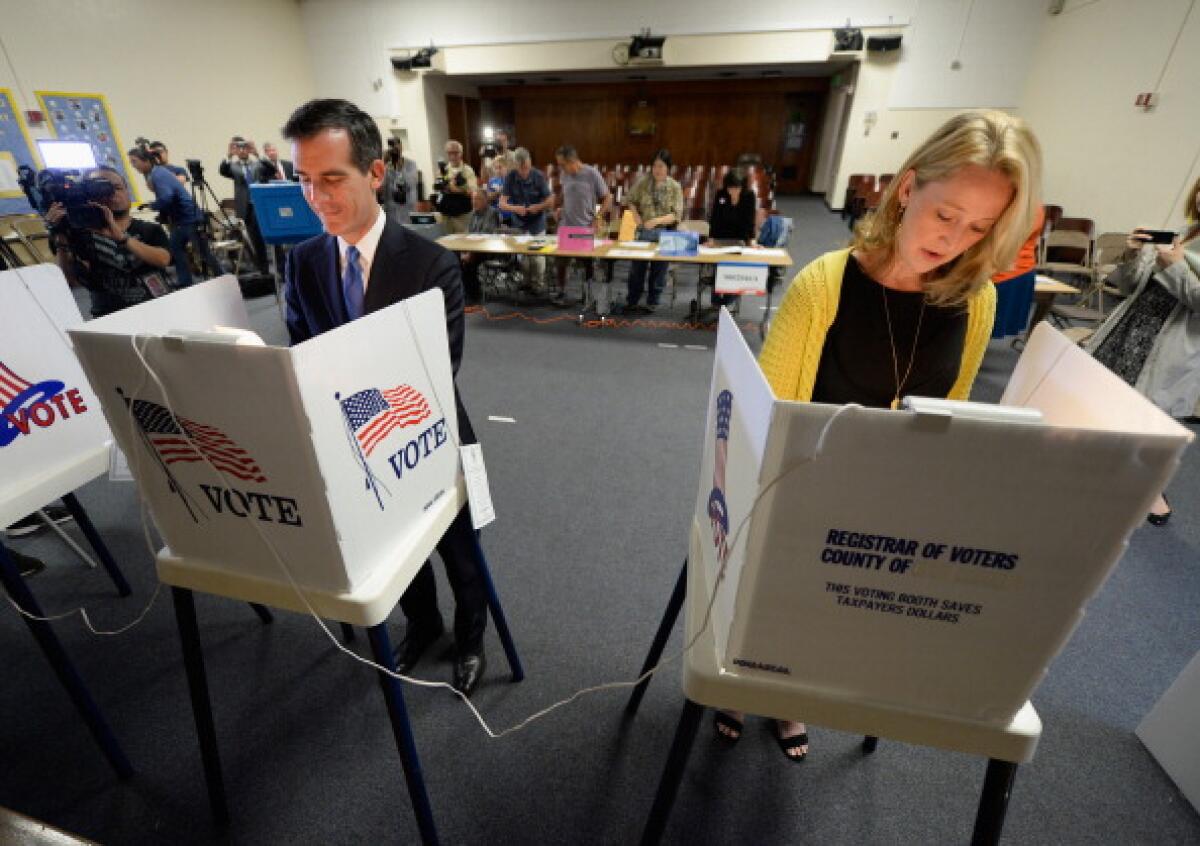
Before the pandemic, women would crowd into Getty House at least three or four times a year for workshops and speeches, with Wakeland as their host for a “Women’s Leadership Series.”
The first lady worked hard to overcome her discomfort with public speaking, because she felt it would help the cause, her friends said.
“She has been this incredible force for positive change,” said Julie Gutman Dickinson, a labor attorney and friend. “She inspires younger folks and schoolchildren from Los Angeles and disadvantaged women that they can aspire to greater things in their careers and in their lives.”
At Wakeland’s insistence, women hold at least half of the positions on city commissions.
And she has pushed to increase the hiring of women in city departments. The mayor’s office boasts that 40% of programmers in the city’s Information Technology Agency are now women, compared with 21% nationally in similar jobs. The Fire Department ended the year with 114 female firefighters, or 3.4%, an increase since Garcetti took office, though short of his goal of 5% by 2020.
Youth sports programs sponsored by the city used to have twice as many spots for boys as girls. But Garcetti, who turned 50 last week, recalled how his wife “shined a light on something that could have been just accepted.” The mayor called the new gender parity in city sports “life changing” for many girls.
There was a time when “The Imperial March (Darth Vader’s Theme)” from “Star Wars” would sound from Garcetti’s phone any time his wife was calling. The mayor said he employed the special ring “tongue in cheek.” But aides said that when they heard the menacing refrain they knew that other priorities immediately would fade into the background.
When Wakeland calls, Garcetti listens.
Those seeking Garcetti’s endorsement recognized Wakeland’s singular stature. Some candidates have been told it’s wise to secure the first lady’s support to improve their chances of winning over the mayor.
“She has her own network and her own relationships that go beyond Eric,” said former Assemblywoman Cindy Montañez, explaining why candidates confer with Wakeland. “She knows a whole bunch of people in progressive and national circles.”
Another candidate didn’t appreciate Wakeland’s role, saying: “I was seeking Eric, I wasn’t seeking Amy.”
A longtime City Hall lobbyist said he made sure to give generously to causes Wakeland favored, like the union-allied Los Angeles Alliance for a New Economy. “You’d give to be safe,” said the lobbyist, who asked to remain anonymous. “You didn’t want to miss that embrace.”
Another crucial connection to Garcetti’s inner circle centered on Jacobs. The hard-charging advisor first came into the couple’s orbit in 2003, when he and Wakeland worked on Howard Dean’s presidential campaign in California.
Wakeland and Garcetti valued Jacobs’ aggressive fundraising and his deep loyalty, other aides said. By the time he officially joined Garcetti’s team, Jacobs talked to the first lady daily, often multiple times a day, several people familiar with the pair said. Because of his particularly strong bond with the first lady, one former aide said, Jacobs “had been viewed as above others in the mayor’s office.”
Jacobs managed to survive previous controversies, such as when a prominent business leader claimed in 2019 that she had been threatened by Jacobs when he was trying to win support for a school tax measure supported by Garcetti. (Jacobs denied making the threats.)
Wakeland said she could not discuss the sexual harassment allegations against Jacobs, given the ongoing investigation. But she denied playing a role in keeping him in Garcetti’s circle over the years, saying, “I am not involved in any personnel decisions.” Garcetti added: “The implication that, knowing there’s bad stuff, she kept [Jacobs] there, that’s just false.”
**
Garcetti and his future wife grew up 2,000 miles, and a world, apart.
His father, Gil, was a rising star in the Los Angeles County district attorney’s office before becoming the county’s top prosecutor in 1992. His mother, Sukey, ran a family foundation, bolstered by wealth from her family’s highly successful clothing business. The younger Garcetti had a comfortable upbringing in Encino and attended the prestigious Harvard School (now Harvard-Westlake) before Columbia University.
Wakeland began life in Indiana, a stranger to privilege. Her family moved so often it felt as if they were attached to the military. But the vagabond existence really grew out of her mother’s constant search for work. Wakeland helped pay her way through Albion College in Michigan by working as a waitress and a dispatcher for the campus police department.
When she won a Rhodes scholarship, her life took a dramatic turn. She suddenly found herself studying at Oxford, with some of America’s most promising young scholars, including future U.S. Sen. Cory Booker (D-N.J.) and Garcetti.
A partnership emerged. While Garcetti became the headliner, winning a Los Angeles City Council seat, then the council presidency and, finally in 2013, the mayor’s office, Wakeland operated mostly in the background.
She worked as director of the Coalition for Kids, a school reform political action group backed by former Mayor Richard Riordan and billionaire Eli Broad. Wakeland helped promote the coalition’s candidates and their initiatives — such as relieving school crowding and improving the academic progress of underserved students.
When her husband won his Hollywood-area council seat in 2001, Wakeland became a quiet force in his office. “She didn’t control his schedule, but she restructured it frequently,” said one advisor.
For those who doubted that Wakeland would speak out on city policy, following Garcetti’s 2013 election as mayor, they got an answer when he began to craft his first budget.
It included the hiring of 50 part-time traffic officers to raise an additional $5 million in parking revenue. Economic justice groups trashed the parking plan, saying that expensive tickets fell disproportionately on the poor.
Wakeland agreed. She told the mayor’s staff the criticism was “stressing” her out and that the policy would surely turn even some Garcetti allies into enemies, according to one staffer’s record of her complaints. Wakeland insisted on reconsideration of what she deemed “such a bad idea!”
Though Wakeland’s objections did not become public at the time, the Los Angeles City Council seemed to concur, voting down the mayor’s proposal to hire more parking officers.
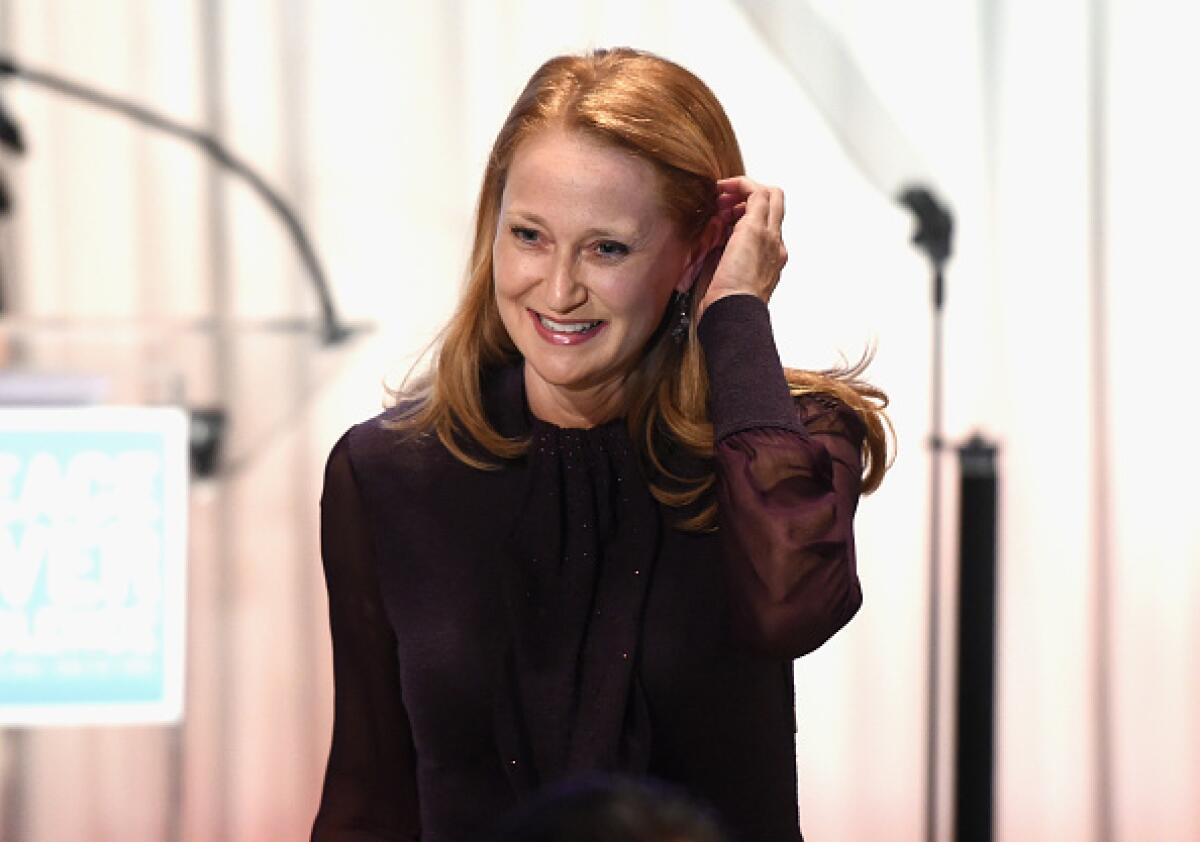
“Amy would fulminate and care deeply about issues,” said one former mayoral aide. “She was like the thunder you would hear offstage. She wasn’t always central. But certainly the people onstage were paying attention.”
Wakeland is known to respond furiously if she thinks her husband is being slighted.
One labor leader recalled Wakeland shouting over the phone about what she believed was the organization’s effort to set itself apart from Garcetti in the 2014 campaign to set a new citywide minimum wage in Los Angeles. “She thought we were taking the lead away from Eric,” recalled the leader, who asked to remain anonymous.
A federal judge, incensed by conditions for homeless people during the recent rainstorm, held a hearing on skid row to demand solutions.
Union and city leaders eventually united over a proposal that increased the wage from $9 an hour to $15 per hour.
Wakeland rejected the claim that she had yelled at a labor leader over a break with her husband.
“My arguments were all about, ‘We need to go for it right now. We need to go for a universal minimum wage,’” without “carve-outs” for some groups of workers, she said.
Her friend Gutman said that any ferocity Wakeland exhibited came from a protective instinct.
“She’s a strong, compassionate mama bear,” Gutman said. “She is very protective and loving of all those around her.”
**
Wakeland likes to schedule her time precisely, to measure the results of her projects via data and to stick to her plans. In past interviews, she has contrasted that with her husband’s relatively more spontaneous approach.
She said her life since last March had been consumed with caring for Maya, who recovered after a mild case of COVID-19, and helping others cope with the disease. (The couple also helped raise more than half a dozen foster children.)
The citizens she assists are ones she has met over the years in her work for groups aiding the poor and victims of sexual and spousal abuse. (She has been a donor and active volunteer for the Coalition to Abolish Slavery and Trafficking.) She helps arrange coronavirus tests, legal advice, counseling and quarantine housing.
“I will not say ‘No’ to someone who asks me for help,” Wakeland said. She said this commitment could at times be “exhausting.”
Some of the couple’s aspirations reach years into the future, including the 2028 Olympics, an event both see as a pivotal moment for Los Angeles. Wakeland serves on the organizing committee for the 2028 Summer Games, and predicted it would play a “big part” in Los Angeles’ economic recovery. Garcetti is pushing to have several new transit lines open in time for the lighting of the Olympic torch.
And with an optimism others might find foolhardy, Garcetti has set another monumental goal for the Olympic year: ending street homelessness in L.A.
“Our life is about working hard,” Wakeland said. “Our life is about public service.”
There’s at least one other way that the Garcetti family is reminded of the responsibilities. It’s a homemade list, written on construction paper and posted near the front door, detailing values like kindness, compassion, generosity and hard work.
During the years when the couple raised foster children in their home, a couple of the teenagers scribbled one addition to the list: “How about more freedom?”
And Wakeland recalled her husband making another amendment. It said: “How about fun?”
More to Read
Sign up for Essential California
The most important California stories and recommendations in your inbox every morning.
You may occasionally receive promotional content from the Los Angeles Times.
